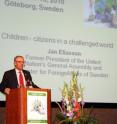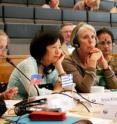Early childhood education important for sustainable development
Early childhood education can play a key role in relation to change when the world fails to adopt a sustainable approach economically, ecologically and socially. This was highlighted at the World Congress "Children, citizens in a challenged world", which was hosted by the University of Gothenburg.
In a statement, the congress urges governments around the world to protect children's right to a childhood.
More and more people are realising that work with young children is a force for change in itself, towards creating a different society. Early childhood education has an important role to play here, perhaps the most important role of all," says Ingrid Pramling Samuelsson, Professor in Early Childhood Education at the University of Gothenburg and President of the organisation OMEP, Organisation Mondiale pour l'Éducation Préscolaire, which was responsible for organising the congress in Gothenburg.
Early education
During the congress, Ingrid Pramling Samuelsson gave a lecture on the link between early childhood education and sustainable development.
"Research shows the advantages of starting at an early age. Children understand what is important in relation to their own environment and based on their own experiences," explained Professor Samuelsson.
Former Chairman of the UN General Assembly and former Swedish Foreign Minister Jan Eliasson spoke at the congress and drew a somewhat dismal picture of the situation as regards respect for some of the world's most vulnerable children:
"Children already have fundamental rights, but they are not respected. These rights are not implemented, they are not incorporated into national legislation, or they are simply not known about," he said.
Pledges unfulfilled
"We have fundamental human rights, ratified in 1948, the UN Convention on the Rights of the Child from 1989, as well as the eight Millennium Development Goals adopted by all the UN states, which aim to halve the proportion of people living in poverty by the year 2015, and where many of the goals directly affect children," said Mr Eliasson.
However, actual figures reveal that change is not happening fast enough to achieve the goal by 2015, in the areas that affect children as well, such as education for all children.
"We're failing to fulfil our pledges. Children are dying of hunger and because of poor water supplies. They are being exploited sexually, as child workers and child soldiers. We're talking about human devastation on a massive scale," said Jan Eliasson.
Declaration to all governments at local and national levels:
"World declaration about the right and the joy to learn through play / OMEP 2010
During the OMEP World Assembly and Congress in Göteborg, Sweden in August 2010, all delegates representing seventy-two countries and five continents, agree that we must defend the UN Convention on the Rights of the Child, especially the right of children to play as well as ensuring their wellbeing in all countries and in educational programs.
Today, because of political and financial problems, most governments are overemphazising the swift development of literacy and numeroucy skills for our children when they start school. This results in dramatically restricting the holistic approach to early childhood education.
This situation is destroying the basis and the sense of early childhood education. This results in the loss of crucial values, creativity, imagination, open mindedness, expressive arts, thus deeply affecting the right and the joy to learn through play.
We now know, that the UN Millenium development goals on reducing poverty and giving all children the right to education will not be met. Thus, the OMEP World Congress and Assembly implore all governments at local and national levels to reorient their plans and allocate resources so that the goals will be met.
Young children are willing and capable to be agents of change. Adults should listen to children and be aware of their perspectives and ideas in matters that relate directly to them:
'We know stuff too!' (six year old child) Ingrid Engdahl, Congress Chair"
Source: University of Gothenburg
Other sources
- Early childhood education important for sustainable developmentfrom PhysorgMon, 13 Sep 2010, 14:14:18 UTC
- Early childhood education important for sustainable developmentfrom Science BlogMon, 13 Sep 2010, 14:07:15 UTC

